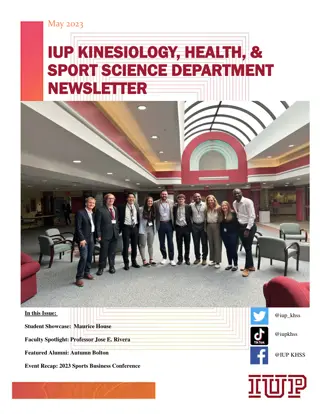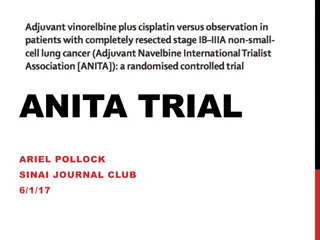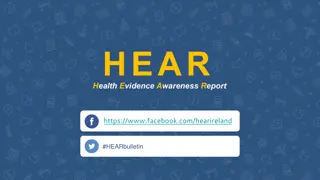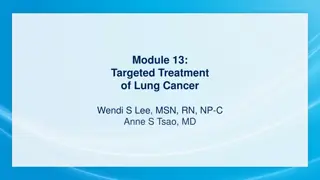
Cholangiocarcinoma Targeted Therapies in Current Treatments
Explore the latest advancements in targeted therapies for cholangiocarcinoma, including first-line and second-line treatment options such as cisplatin/gemcitabine and immunotherapy. Discover the need for novel therapeutic approaches in managing this challenging biliary tract cancer.
Download Presentation

Please find below an Image/Link to download the presentation.
The content on the website is provided AS IS for your information and personal use only. It may not be sold, licensed, or shared on other websites without obtaining consent from the author. If you encounter any issues during the download, it is possible that the publisher has removed the file from their server.
You are allowed to download the files provided on this website for personal or commercial use, subject to the condition that they are used lawfully. All files are the property of their respective owners.
The content on the website is provided AS IS for your information and personal use only. It may not be sold, licensed, or shared on other websites without obtaining consent from the author.
E N D
Presentation Transcript
CHOLANGIOCARCINOMA TARGETED THERAPIES APPROACHES Roniel Cabrera M.D., M.S. University of Florida Health Gainesville, FL, USA September 2020 2
DISCLAIMER Please note: Views expressed within this presentation are the personal opinions of the author. They do not necessarily represent the views of the author s academic institution or the rest of HCC CONNECT group. This content is supported by an independent educational grant from Bayer. Disclosures: Dr Roniel Cabrera has received honoraria from the following: Bayer, Eisai, Exelixsis. 3
CHOLANGIOCARCINOMA Cholangiocarcinoma is a biliary tract cancer type and includes: Mass-forming Periductal-infiltrating Bile 1. Intrahepatic cholangiocarcinoma, iCCA (10-20%)1: Incidence is increasing 2nd most common primary liver cancer (after HCC) ductules iCCA (10 20%) Segmental ducts 2. Extrahepatic cholangiocarcinoma, eCCA (80-90%)1: Includes perihilar (pCCA) and distal (dCCA) Incidence is decreasing Left, right, common hepatic ducts pCCA (50 60%) Intraductal- growing Common bile duct Prognosis remains poor with 5-year survival of around 5-15%2 dCCA (20 30%) dCCA, distal cholangiocarcinoma; eCCA, extrahepatic cholangiocarcinoma; HCC, hepatocellular carcinoma; iCCA, intrahepatic cholangiocarcinoma; pCCA, perihilar cholangiocarcinoma; OS, overall survival 1. Banales JM, et al. Nat Rev Gastroenterol Hepatol. 2020; Online ahead of print; 2. Lamarca A, et al. J Hepatol. 2020;73:170-85 Source figure: Banales JM, et al. Nat Rev Gastroenterol Hepatol. 2020; Online ahead of print 4
CHOLANGIOCARCINOMA: CURRENT TREATMENTS OPTIONS First-line treatment options: Phase 3 UK ABC-02 trial established cisplatin + gemcitabine as a standard of care:1 Median survival 11.7 months for cisplatin + gemcitabine vs 8.1 months for gemcitabine alone (HR, 0.64; 95% CI: 0.52-0.80; P<0.001) The combination of gemcitabine + cisplatin well tolerated with similar AEs between the two groups These results were supported by a Japanese randomised trial (BT22 study) showing that gemcitabine + cisplatin therapy was effective and well tolerated Second-line treatment options: There is no standard of care in second-line chemotherapy or targeted therapy2 One of the current strategies in 2L is based on immunotherapy based treatment with anti-PD1/PD-L1 and anti-CTLA-4 products Recent publication demonstrated promising results with multikinase inhibitor (regorafenib) in 2L (as well as 3L) treatment3 Median PFS in the regorafenib group was 3.0 months (95% CI: 2.3-4.9) and 1.5 months (95% CI: 1.2-2.0) in the placebo group (HR 0.49; 95% CI: 0.29-0.81; P = 0.004) Median overall survival was 5.3 months (95% CI: 2.7-10.5) and 5.1 months (95% CI: 3.0-6.4), respectively (P = 0.28). There were no unexpected/new safety signals There is an urgent need for novel therapeutic strategies: Promising data raised with targeted therapy on molecularly defined subgroup of patients 2L, second-line; AEs, adverse events; CI, confidence interval; CTLA-4, cytotoxic T-lymphocyte-associated protein 4; HR, hazard ratio; PD1/PD-L1, programmed death/programmed death ligand 1; PFS; progression-free survival 1. Valle J, et al. New Engl J Med. 2010;362:1273-81; 2. Valle J, et al. Ann Oncol. 2016;27(suppl 5):v28-v37; 3. Demols A, et al. Ann Oncol. 2020;31:1169-77 5
POTENTIALLY TARGETABLE GENOMIC ALTERATIONS IN CHOLANGIOCARCINOMA Alterations Current products under investigations iCCA eCCA derazantinib (ARQ-087), infigratinib (BGJ398), erdafitinib, TAS-120, pemigatinib, AZD4547 FGFR fusion 15-20% < 5% ivosidenib (AG-120), enasidenib (AG-221), BAY-1436032, IDH305 IDH1/2 mutation ~20% < 5% trastuzumab, lapatinib, TAS0728, A166, PRS-343, ZW25 ERBB2 (HER-2) amplification < 5% 10-15% BRAF mutation ~5% < 5% dabrafenib + trametinib DNA damage response gene mutation (ARID1A, BRCA1/2) ~25% 10-15% PARP inhibitors: olaparib, rucaparib Genomic sequencing of patients with CCA, should be performed early in order to identify those patients who harbour targetable aberrations Therapies targeting alterations in FGFR, IDH1/2 will be discussed in this presentation BRAF, proto-oncogene B-Raf; CCA, cholangiocarcinoma; eCCA, extrahepatic CCA; ERBB2, Erb-B2 receptor tyrosine kinase 2; FGFR, fibroblast growth factor receptor; HER-2, human epidermal growth factor receptor 2; iCCA, intrahepatic CCA; IDH1/2, isocitrate dehydrogenase 1/2; PARP, poly(ADP-ribose) polymerase Source table: Mizrahi JD and Shroff RT. Curr Treat Options Oncol. 2020;21:63 6
CLINICAL DEVELOPMENT OVERVIEW WITH IDH INHIBITORS IN CHOLANGIOCARCINOMA* IDH inhibitor Mechanism of action Current clinical trial phase ClinicalTrials. gov identifier Status ivosidenib (AG-120) Mutant IDH1 inhibitor Phase 3 (ClarIDHy) NCT02989857 Active not recruiting olutasidenib (FT 2102) Mutant IDH1 inhibitor Phase 1/2 NCT03684811 Focusing on glioma enasidenib (AG-221/CC-90007) Mutant IDH2 inhibitor Phase 1/2 NCT02273739 Focusing on AML IDH305 Mutant IDH1 inhibitor Phase 1 NCT02381886 Suspended BAY1436032 Mutant IDH1 inhibitor Phase 1 NCT02746081 Focusing on AML vorasidenib (AG-881) Mutant IDH1/2 inhibitor Phase 1 NCT02481154 Focusing on low-grade glioma *Search done in ClinicalTrials.gov (as of 16 July 2020) for IDH inhibitor in cholangiocarcinoma disease and validated in the clinical development pipelines section of the company s website AML, acute myelogenous leukaemia; IDH1/2, isocitrate dehydrogenase 1/2 7
FIRST PHASE 3 RESULTS WITH IDH INHIBITOR IN CHOLANGIOCARCINOMA: ClarIDHy TRIAL DESIGN ClarIDHy (NCT02989857): randomized phase 3 trial assessing ivosidenib (IDH1 inhibitor) vs placebo in patients with advanced cholangiocarcinoma harbouring an IDH1 mutation. Key eligibility criteria Histologically confirmed CCA ECOG PS 0-1 1-2 prior therapies (at least 1 gemcitabine - or 5-FU- containing regimen) Adequate hematologic, hepatic and renal function Ivosidenib 500 mg QD orally Continuous 28-day cycles (n=124) Crossover permitted at disease progression Eligible patients with mIDH1 CCA R 2:1 Placebo (n=61) (n=185) Secondary endpoints include Safety and tolerability ORR Primary endpoint PFS assessed by independent radiology centre review OS DoR TTR PK/PD QoL Study period: between 20 February 2017 and 31 January 2019 5-FU, fluorouracil; CCA, cholangiocarcinoma; DoR, duration of response; ECOG PS, Eastern Cooperative Oncology Group performance status; IDH1, isocitrate dehydrogenase 1; mIDH1, mutation in isocitrate dehydrogenase 1; ORR, objective response rate; OS, overall survival; PD, pharmacodynamic; PFS, progression-free survival; PK, pharmacokinetic; QD, once a day; QoL, quality of life; R, randomized; TTR, time to response Abou-Alfa GK, et al. Lancet Oncol. 2020;21:796-807 8
FIRST PHASE 3 RESULTS WITH IDH INHIBITOR IN CHOLANGIOCARCINOMA: ClarIDHy TRIAL EFFICACY Data cut-off date: 31 January 2019 Primary endpoint: PFS by IRC review Ivosidenib (n=124) Baseline characteristics Ivosidenib (n=124) Placebo (n=61) Placebo (n=61) Previous line of therapy: Median PFS, months (95% CI) 2.7 (1.6-4.2) 1.4 (1.4-1.6) One Two 66 (53%) 58 (47%) 33 (54%) 28 (46%) HR (95% CI), p value 0.37 (0.25-0.54), p<0.0001 ECOG PS 6-month PFS rate, % (95% CI) 32 (23-42) NE 0 1 2 3 49 (40%) 74 (60%) 0 1 (1%) 19 (31%) 41 (67%) 1 (2%) 0 12-month PFS rate, % (95% CI) 22 (13-32) NE Cholangiocarcinoma type of diagnosis Intrahepatic Extrahepatic Perihilar Unknown Secondary endpoints Ivosidenib (n=124) Placebo (n=61) 111 (90%) 1 (1%) 4 (3%) 8 (6%) 58 (95%) 1 (2%) 0 2 (3%) Median OS, months (95% CI) 10.8 (7.7-17.6) 9.7 (4.8-12.1) HR (95% CI), p value 0.69 (0.44-1.10), p=0.060 IDH1 mutation R132C R132L R132G R132S R132H 84 (68%) 21 (17%) 17 (14%) 2 (2%) 0 45 (74%) 7 (11%) 6 (10%) 1 (2%) 2 (3%) 6-month OS rate, % (95% CI) 67 (56-75) 59 (44-71) 12-month OS rate, % (95% CI) 48 (36-59) 38 (22-54) CI, confidence interval; ECOG PS, Eastern Cooperative Oncology Group performance status; HR, hazard ratio; IDH1, isocitrate dehydrogenase 1; IRC, independent radiology centre; NE, not estimable; OS, overall survival; PFS, progression-free survival 9 Abou-Alfa GK, et al. Lancet Oncol. 2020;21:796-807
FIRST PHASE 3 RESULTS WITH IDH INHIBITOR IN CHOLANGIOCARCINOMA: ClarIDHy TRIAL SAFETY Data cut-off date: 31 January 2019 Safety endpoints Ivosidenib (n=121) Placebo (n=59) Most common AE grade 3 in both treatment arms = ascites 9 (7%) 4 (7%) SAE 36 (30%) 13 (22%) Treatment related SAE 3 (2%) 0 TEAE requiring dose reduction 4 (3%) 0 TEAE leading to treatment discontinuation 7 (6%) 5 (8%) TRAE leading to treatment discontinuation 2 (2%) N/A AE, adverse event; IDH, isocitrate dehydrogenase; N/A, not applicable; SAE, serious adverse event; TEAE, treatment emergent adverse event; TRAE, treatment-related adverse event Abou-Alfa GK, et al. Lancet Oncol. 2020;21:796-807 10
FIRST PHASE 3 RESULTS WITH IDH INHIBITOR IN CHOLANGIOCARCINOMA: ClarIDHy TRIAL CONCLUSION ClarIDHy phase 3 trial met its primary endpoint: PFS (2.7 vs 1.4 months; p<0.0001) It showed a favourable trend with OS and tolerable safety profile Ivosidenib showed clinically relevant efficacy with a tolerable safety profile in advanced CCA harbouring IDH1 mutation Genomic testing should become a standard of care procedure in order to find patient with advanced CCA harbouring IDH1 mutation who can then benefit from targeted therapy CCA, cholangiocarcinoma; IDH1, isocitrate dehydrogenase 1; OS, overall survival; PFS, progression-free survival Abou-Alfa GK, et al. Lancet Oncol. 2020;21:796-807 11
CLINICAL DEVELOPMENT OVERVIEW WITH FGFR INHIBITORS IN CHOLANGIOCARCINOMA* FGFR inhibitor Genetic alterations in CCA population Clinical trial phase Trial Identifier Status pemigatinib FGFR2 translocations Phase 2 NCT02924376 Active, not recruiting pemigatinib FGFR2 rearrangement Phase 2 NCT04256980 Recruiting futibatinib (TAS-120) FGFR2 gene rearrangements Phase 3 NCT04093362 Not yet recruiting E7090 FGFR2 gene fusions Phase 2 NCT04238715 Recruiting Oral infigratinib (BGJ398) FGFR2 gene fusions/translocations Phase 3 NCT03773302 Recruiting derazantinib (ARQ 087) FGFR2 gene fusions/mutations/amplification Phase 2 NCT03230318 Recruiting infigratinib (BGJ398) FGFR2 genetic alterations Phase 2 NCT02150967 Recruiting HMPL-453 FGFR2 gene fusions Phase 2 NCT04353375 Not yet recruiting pemigatinib FGFR2 rearrangement Phase 3 NCT03656536 Recruiting erdafitinib (JNJ-42756493) FGFR translocations/mutations Phase 2 NCT02699606 Active, not recruiting infigratinib FGFR mutations Phase 2 NCT04233567 Recruiting INCB062079 FGF19/FGFR4 alterations Phase 1 NCT03144661 Terminated debio 1347 FGFR1-2-3 gene fusions/rearrangements Phase 2 NCT03834220 Active, not recruiting *Search done in ClinicalTrials.gov (as of 16 July 2020) for FGFR inhibitor in cholangiocarcinoma disease CCA, cholangiocarcinoma; FGFR, fibroblast growth factor receptor 12
FIGHT-202: FGFR INHIBITOR IN CHOLANGIOCARCINOMA DESIGN FIGHT-202 (NCT02924376): open-label, single arm, multi-cohort, phase 2 trial assessing pemigatinib (FGFR1-2-3 inhibitor) in patients with previously treated locally advanced or metastatic cholangiocarcinoma Key eligibility criteria Adult with local advanced or metastatic CCA ECOG PS 2 Progression after 1 prior therapy Adequate hepatic and renal function Documented FGF/FGFR status Cohort A FGFR2fusions/rearrangements (n=107) Oral pemigatinib Cohort B 13.5 mg once daily Other FGF/FGFR genetic alterations (n=20) 2 weeks-on/1-week-off schedule Cohort C No FGF/FGFR genetic alterations (n=18) Secondary endpoints include ORR in patients with other FGF/FGFR alterations ORR in all patients with FGF/FGRF alterations ORR in patient with no FGF/FGFR alterations Primary endpoint ORR in patients with FGFR2 fusions or rearrangements assessed by ICR DCR DoR PFS OS Safety Study period: between 17 January 2017 and 22 March 2019 CCA, cholangiocarcinoma; DCR, disease control rate; DoR, duration of response; ECOG PS, Eastern Cooperative Oncology Group performance status; FGF, fibroblast growth factor; FGFR, FGF receptor; ICR, independent central review; ORR, objective response rate; OS, overall survival; PFS, progression-free survival Abou-Alfa GK, et al. Lancet Oncol. 2020;21:671-84 13
FIGHT-202: FGFR INHIBITOR IN CHOLANGIOCARCINOMA EFFICACY Data cut-off date: 22 March 2019 Primary and secondary efficacy endpoints FGFR2 fusions or rearrangements (n=107) Other FGF/FGFR alterations (n=20) No FGF/FGFR alterations (n=18) ORR, % (95% CI) 35.5 (26.5-45.4) 0 0 Best overall responses, n (%) Complete response Partial response Stable disease Progressive disease Not evaluable 3 (2.8%) 35 (32.7%) 50 (46.7%) 16 (14.9%) 3 (2.8%) 0 0 8 (40.0%) 7 (35.0%) 5 (25.0%) 0 0 4 (22.2%) 11 (61.1%) 3 (16.7%) Median DoR, months (95% CI) 7.5 (5.7-14.5) DCR, % (95% CI) 82 (74-89) 40 (19-64) 22 (6-48) Median PFS, months (95% CI) 6.9 (6.2-9.6) 2.1 (1.2-4.9) 1.7 (1.3-1.8) Median OS, months (95% CI) 21.1 (14.8- NE) 6.7 (2.1-10.6) 4.0 (2.3-6.5) CI, confidence interval; DCR, disease control rate; DoR, duration of response; FGF, fibroblast growth factor; FGFR, FGF receptor; NE, not estimable; ORR, objective response rate; OS, overall survival; PFS, progression-free survival Abou-Alfa GK, et al. Lancet Oncol. 2020;21:671-84 14
FIGHT-202: FGFR INHIBITOR IN CHOLANGIOCARCINOMA SAFETY Data cut-off date: 22 March 2019 All patients (n=146) 115 (79) FGFR2fusions or rearrangements (n=107)* 76 (71) Other FGF/FGFR alterations (n=20)* 20 (100) No FGF/FGFR alterations (n=18)* 18 (100) Safety endpoints Discontinuation of treatment, n (%) Most common AE: Hyperphosphatemia, n (%) 88 (60) 93 (64) AEs grade 3, n (%) Most frequent AEs grade 3: Hypophosphatemia, n (%) Arthralgia, n (%) Stomatitis, n (%) Hyponatremia, n (%) Abdominal pain, n (%) Fatigue, n (%) 18 (12) 9 (6) 8 (5) 8 (5) 7 (5) 7 (5) 13 (9) 20 (14) 62 (42) 65 (45) Discontinuation treatment owing to AEs AEs leading to dose reduction Dose interruptions due to AEs SAE *One patient with an undetermined FGF/FGFR alteration received pemigatinib and had discontinued by the cut-off date AE, adverse event; FGF, fibroblast growth factor; FGFR, FGF receptor; SAE, serious adverse event Abou-Alfa GK, et al. Lancet Oncol. 2020;21:671-84 15
FIGHT-202: FGFR INHIBITOR IN CHOLANGIOCARCINOMA CONCLUSION Based on FIGHT-202 phase 2 trial, pemigatinib was approved by the United States FDA on April 17, 2020 for the treatment of previously treated, unresectable locally advanced or metastatic CCA with an FGFR2 fusion or other rearrangement Promising efficacy results from other FGFR inhibitors presented at ASCO 2020: FOENIX-CCA21: (NCT02052778) single-arm Phase 2 study: interim analysis presented on 67/103 patients with locally advanced/metastatic iCCA harbouring FGFR2 gene fusions or other rearrangements treated with futibatinib (FGFR1-4 inhibitor). ORR = 34.3% (all partial response n=23), DCR = 76.1%, median TTR=1.6 months (1.0-4.9) Late phase trials (Phase 3) are ongoing: FIGHT-3022 : (NCT03656536): drug product under investigation: pemigatinib Four patients enrolled as of 25 Sep 2019 (target: N=432). Primary endpoint: PFS; secondary endpoints: ORR, OS, DoR, DCR, QoL, safety PROOF3 : (NCT03773302) drug product under investigation: infigratinib Study initiated in February 2019 and plan to enrol 350 patients. Primary endpoint: PFS; secondary endpoints: ORR; OS, DoR, DCR, safety ASCO, Association Society of Clinical Oncology; CCA, cholangiocarcinoma; DCR, disease control rate; DoR, duration of response; FDA, Food and Drug Administration; FGFR, fibroblast growth factor receptor; iCCA, intrahepatic CCA; ORR, objective response rate; OS, overall survival; PFS, progression-free survival; QoL, quality of life; TTR, time to response 1. Goyal L, et al. J Clin Oncol. 2020; 38, no. 15_suppl (May 20, 2020) 108-108; 2. Bekaii-Saab TS, et al. J Clin Oncol. 2020; 38, no. 4_suppl (Abstract # TPS592); 3. Javle MM, et al. J Clin Oncol. 2019; 37, no. 15_suppl (Abstract # TPS4155) 16
REACH HCC CONNECT VIA TWITTER, LINKEDIN, VIMEO & EMAIL OR VISIT THE GROUP S WEBSITE http://www.hccconnect.info A picture containing graphics, drawing A picture containing drawing A picture containing graphics, drawing A close up of a sign Description automatically generated Description automatically generated Description automatically generated Description automatically generated Follow the HCC CONNECT group on LinkedIn Watch us on the Vimeo Channel HCC CONNECT Email Follow us on Twitter @hccconnectinfo froukje.sosef@cor2ed.com 17
HCC CONNECT Bodenackerstrasse 17 4103 Bottmingen SWITZERLAND Dr. Froukje Sosef MD +31 6 2324 3636 froukje.sosef@cor2ed.com Dr. Antoine Lacombe Pharm D, MBA +41 79 529 42 79 antoine.lacombe@cor2ed.com Heading to the heart of Independent Medical Education Since 2012






















